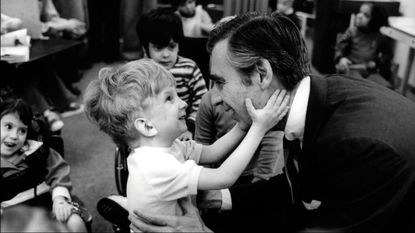Pop culture's comeback of kindness
This is a banner year for nice people in TV and movies

One of the best new additions to Netflix this week isn't a prestige drama, or a killer comedy. Instead, it's the latest batch of episodes from what might be the quietest reality show you've ever seen: Terrace House: Opening New Doors. Terrace House is a Japanese show about young people living in a house together, but unlike, say, The Real World, it's not the least bit confrontational. It's languid, relaxed, and quiet. Its contestants are polite, and its romances are restrained and drawn out. It's incredibly addictive television, and the latest in a trend that you might not even know is happening right now: 2018 is a banner year for gentle pop culture.
Take a look at this week's biggest release in theaters: Disney's Christopher Robin, an Ewan McGregor-led fairy-tale confection about an adult Christopher Robin who's left Winnie the Pooh and his cohort of stuffed animals behind, only to find that he needs their simple unconditional compassion to make sense of his bleak adult life. It's a movie that recalls Paddington 2 from earlier this year, an utterly charming tale about another British bear, sent to prison for a crime he did not commit and still somehow saving the day out of a sheer commitment to being polite and kind to everyone.
This isn't the sole purview of children's fairy tales, either. The documentary Won't You Be My Neighbor, about children's TV icon Fred Rogers and the unlikely success of his show, Mister Rogers' Neighborhood, is breaking box office records. It's a straightforward portrait of a man for whom the most remarkable thing seems to be that he is exactly who he portrayed himself as. Won't You Be My Neighbor isn't selling tickets because it unveils some buried scandal or dark secret. It's just telling you about a nice man who had a mission of kindness, one that you might remember from your childhood.
Subscribe to The Week
Escape your echo chamber. Get the facts behind the news, plus analysis from multiple perspectives.

Sign up for The Week's Free Newsletters
From our morning news briefing to a weekly Good News Newsletter, get the best of The Week delivered directly to your inbox.
From our morning news briefing to a weekly Good News Newsletter, get the best of The Week delivered directly to your inbox.
There's a temptation to paint this year of gentle pop culture as a response to the cultural moment, where much of the public discourse is conducted in extremes, and ideas and actions once deemed verboten are now being normalized with a brazen hostility that can be shocking. And sure, that's likely part of it. But consider this: Optimism is the only interesting place left for pop culture to go.
American pop culture in the 21st century, defined by the foundational trauma of Sept. 11, is largely traceable through grim stories about protagonists who cross lines, anti-heroes, and good men (and emphasis on the "men") gone bad. Jack Bauer, Walter White, Tony Soprano. These were the men upon whose stories a new golden age of television was proclaimed, and they were accompanied by similarly cynical works in movie theaters. The Dark Knight, a film whose hero compromises himself by committing an act of mass surveillance to stop a villain, spurred a wave of blockbusters that were described as dark and gritty, mistaking aesthetics for maturity. The world had become more complicated, and the notion of heroes naïve.
It seems we're finally slowly walking away from that moral outlook. And while it is well-timed, this pop cultural pivot isn't interesting because of current events, it's interesting in spite of them. The simple truth is this: Being good is far harder than the alternative. "Good" is a slippery notion, and in some ways a subjective one. There's also a lot to be gained by wrestling with more complicated and difficult ideas of goodness — more than there is, I would argue, in exploring the means by which decent people are soured.
It's for this reason that you could make a compelling argument for The Good Place — the NBC comedy about a woman (Kristen Bell) who lived an awful life on Earth only to find she has died and accidentally gone to heaven — as being the definitive show of this decade, partly because of the ways in which it's a response to the previous one. Where dramas were seen as the height of prestige in the aughts, The Good Place is a comedy. Where morally grey heroes were the stock and trade of addictive pop culture, The Good Place's moral center is an actual ethicist. Where prestige shows were decompressed and sprawling, The Good Place is compact and intricate, a stunning clockwork of jokes and beautiful character moments and brave plotting.
But mostly, it is a show about the difficult work of empathy and goodness. How we think we understand it, when we really don't. But it's achievable — and that's why works like Won't You Be My Neighbor, the posthumous celebration of Anthony Bourdain's work in shows like No Reservations, and yes, Paddington 2 matter. It's hard to be good, but you can do it — and be tremendously entertained by watching others do it too.
Sign up for Today's Best Articles in your inbox
A free daily email with the biggest news stories of the day – and the best features from TheWeek.com
Joshua Rivera is a freelance entertainment journalist and critic who has written for GQ, Vulture, and Entertainment Weekly.
-
 Why Bhutan hopes tourists will put a smile back on its face
Why Bhutan hopes tourists will put a smile back on its faceUnder The Radar The 'kingdom of happiness' is facing economic problems and unprecedented emigration
By Chas Newkey-Burden, The Week UK Published
-
 7 beautiful towns to visit in Switzerland during the holidays
7 beautiful towns to visit in Switzerland during the holidaysThe Week Recommends Find bliss in these charming Swiss locales that blend the traditional with the modern
By Catherine Garcia, The Week US Published
-
 The Week contest: Werewolf bill
The Week contest: Werewolf billPuzzles and Quizzes
By The Week US Published
-
 Walter Isaacson's 'Elon Musk' can 'scarcely contain its subject'
Walter Isaacson's 'Elon Musk' can 'scarcely contain its subject'The latest biography on the elusive tech mogul is causing a stir among critics
By Theara Coleman Published
-
 Welcome to the new TheWeek.com!
Welcome to the new TheWeek.com!The Explainer Please allow us to reintroduce ourselves
By Jeva Lange Published
-
 The Oscars finale was a heartless disaster
The Oscars finale was a heartless disasterThe Explainer A calculated attempt at emotional manipulation goes very wrong
By Jeva Lange Last updated
-
 Most awkward awards show ever?
Most awkward awards show ever?The Explainer The best, worst, and most shocking moments from a chaotic Golden Globes
By Brendan Morrow Published
-
 The possible silver lining to the Warner Bros. deal
The possible silver lining to the Warner Bros. dealThe Explainer Could what's terrible for theaters be good for creators?
By Jeva Lange Last updated
-
 Jeffrey Wright is the new 'narrator voice'
Jeffrey Wright is the new 'narrator voice'The Explainer Move over, Sam Elliott and Morgan Freeman
By Jeva Lange Published
-
 This week's literary events are the biggest award shows of 2020
This week's literary events are the biggest award shows of 2020feature So long, Oscar. Hello, Booker.
By Jeva Lange Published
-
 What She Dies Tomorrow can teach us about our unshakable obsession with mortality
What She Dies Tomorrow can teach us about our unshakable obsession with mortalityThe Explainer This film isn't about the pandemic. But it can help viewers confront their fears about death.
By Jeva Lange Published